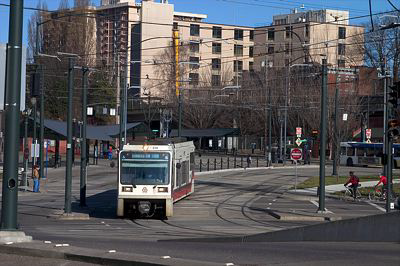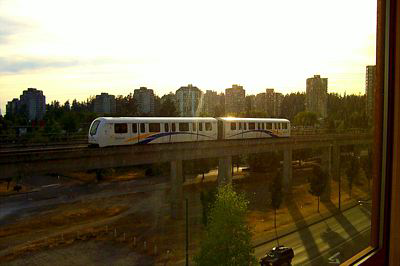No Light Rail in Vancouver!
Portland Needs a Dose of Reality, Not Another Vision

Randy Gragg, the architecture critic for the Portland Oregonian, thinks that Portland “lacks a coordinated transportation plan” and needs a “grand vision” to deal with transportation in the future. In fact, what Portland needs is to deal with the reality of how people really live, not a vision for how some people think everyone else ought to live.
In 1992, Portland-

Portland light rail and mid-
On that point, I fully agree. But while Gragg seems to think that the solution is
a multi-
Unfortunately, Gragg’s May 20 Sunday Oregonian article is not (yet?) available on
line. But, as examples of “vision,” Gragg points to Denver, which approved a $4.7-
- Swayed by a $3 million political campaign funded by rail contractors, developers,
and engineering companies, Denver voters agreed in 2004 to build a rail system that
they were told would reduce congestion. Yet agency documents revealed that the proposed
rail lines would take no more than one-
half percent of cars off the roads. Though not a single rail has been laid since the plan was approved, the transit agency is already projecting 32- percent cost overruns and a $1 billion revenue shortfall. - Houston voters narrowly approved a plan that promised to build five light-
rail lines with no new taxes. Since then, the transit agency says it can afford to build only one light- rail line and it will use buses in the other four corridors. Since opening its first light- rail line, Houston’s transit ridership has actually declined, and if it were put back on the ballot, Houston voters would probably reject any more rail construction. - Phoenix voters agreed to fund a huge program of new freeways and roads that happened
to include one light-
rail line that had previously been rejected by voters three times. The line never would have been approved were it not tacked onto the roads program.
Gragg has some of his facts wrong, claiming voters approved tax increases “by wide margins” in all three cities. In fact, the Houston plan involved no new taxes and it was approved by less than 52 percent of the voters.
More generally, the rail transit component that Gragg emphasizes in each of these
plans is hardly a good example for Portland. Spend billions of dollars to take one-
Gragg himself seems to admit that light rail is not the right choice for Portland.
First, there is “the finite capacity of MAX trains limited to the length of 200-
Second, says Gragg, “the whole system’s s-
Where else does Gragg recommend we look for inspiration? Vancouver, BC, whose Skytrains
“go fast.” Well, actually, they, too, average only 22 miles per hour. And, instead
of building more Skytrains, Vancouver is now planning a light-

Skytrain passing high rises. Flickr photo by Adam Simms.
The other thing Gragg likes about Vancouver is that they are building high-
Wait a minute, Randy, remember that part about light-
Gragg has been an apologist for Portland’s Goldschmidt-
“The area lacks a coordinated transportation plan,” thinks Gragg. Actually, it has one that Metro endlessly updates every five years. It is just that Metro has not been able to sell this plan, or the vision behind it, to the voters.
The real problem is more fundamental: It is simply not realistic to ask an agency
like Metro, which is supposed to manage everything from trash collection to the Portland
Zoo, to write comprehensive, long-
Portland doesn’t need a new vision. It needs a new dose of reality. No matter how much light rail you build, almost all travelers will continue to get around by car. To accommodate those cars, we don’t need a new highway to Damascus. We need an entirely new institutional set up.
- Forget about long-
term visions. Nobody knows what tomorrow will bring, much less twenty years from now. - Forget about stopping global warming by getting people to drive less. The solution to greenhouse gases is the same as the solution to toxic pollution: technological improvements that reduce auto emissions.
- Forget about comprehensive planning; government can’t think comprehensively. Instead,
scrap Metro and replace it with mission-
specific agencies. Make one of those agencies a tollroads authority and give it the mission of building new roads or lanes wherever there is enough congestion that new capacity will pay for itself in tolls. - Forget about multi-
billion- dollar tax- subsidized transit projects. Instead, let TriMet and other transit providers run their buses on the uncongested toll lanes, thus providing low- cost but superior transit to those who can’t (or prefer not to) drive.
3
Trackback • Posted in News commentary, Transportation, Urban areas
Reprinted from The Antiplanner